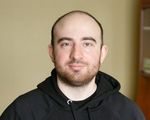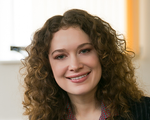About Success Builder
How do you find your place in life? How do you find something to do that both comes naturally to you and makes you happy? The answer is that you have to apply the knowledge you’ve gained from university and from life itself correctly. The Success Builder Project features HSE University graduates who have discovered themselves through an interesting business or an unexpected profession. The protagonists share their experiences and lessons learnt and talk about how they’ve made the most of the opportunities they were given.
Yevgeny Gubar, a graduate of the HSE University Business Informatics programme, joined fellow students to found KIT Consulting at the age of 20. The company has since become a highly successful brand for implementing corporate management systems. In this interview with Success Builder, Mr. Gubar explained how to remove students’ rose-colored glasses and teach them how to make business decisions, how sports help in entrepreneurship, and why industry practitioners lecture at universities.
How did you decide to become a techie?
It was not a completely conscious choice; it was actually my parents who guided me in this direction, and I am grateful to them for it. They gathered information and consulted with knowledgeable people because they themselves had built careers in completely different fields. My mother teaches at the Gnesins Russian Academy of Music and my father works in the theatre. They concluded that business informatics is a very promising area and that HSE is the best university where you can truly get a prestigious and high-quality education.
At that time, few people could imagine which jobs would be available in business informatics because the field was so new. Although the demand was actually great, there were very few specialists. Even after I started my studies, I still didn’t understand what kind of skills I would ultimately have. In our first year, a teacher in mathematical analysis asked us, ‘Do you know what an expert in business informatics does?’ We shrugged. ‘You’ll be those guys who sell pirated software at the Savelovsky market,’ he joked. Of course, we didn’t end up selling pirated material, but we did learn how to create our own software. In fact, I quickly understood the reason behind what we were learning: by the end of the first year, I knew that I had found my niche in digital technologies and saw clear opportunities to develop along these lines.
How did you decide where to work? Which job were you hoping to get?
Starting in my second year of studies, I began to appreciate the professional qualities of those around me. These were smart people who managed to build successful careers in Russia and abroad. Their success inspired me and I tried to follow their example. They all wanted to work and managed to do so. They were not shy about interviewing with the most prestigious employers and they landed the best positions. I became the same—bold and willing to find the best application of my knowledge.
Still, I differed from my fellow students in that I had always wanted to have my own business in this field
Of course, like others, I had the experience of interviewing with different companies: I wasn’t accepted at some but got internships at others. Then, starting at the end of my third year, I began studying the market and the technology needs of business. I found a niche and realised that I should create my own project. So, I joined fellow students and created the KIT Consulting company, which is still doing well today and employs many HSE University graduates in various positions.
Was this your first experience running your own business?
Yes, it was a test run and I must say that I was lucky the project succeeded right from the start. I wanted to apply my knowledge in the best possible way and on my own. Of course, it wasn’t easy; I managed to build a successful business only after incredible effort and making lots of mistakes, like any entrepreneur. I was 20 when I started, and in hindsight I can say that it would have been possible to achieve the same thing twice as quickly and at half the cost, without losing hair and so many sleepless nights. But now, I have rich entrepreneurial experience and I can share valuable lessons with those who are just starting on this path.
I recently met one of my first HSE University professors and he asked me, ‘What do you think was missing from the programme?’ The first thing I said was ‘entrepreneurial skills.’ You study the use of technology in business optimisation, but you aren’t taught real-world skills; you aren’t given the opportunity to communicate directly with entrepreneurs, to learn about their failures and triumphs through specific situations that arise in companies. I had to gain these lessons firsthand while building my own business. So, when speaking to students at different universities, I try to share with them as much as possible the useful business solutions that I have tested on myself.
What are these entrepreneurial skills and qualities and how can they be taught?
During my career as an entrepreneur, I have seen, hired, and partnered with hundreds of different specialists, and came to the conclusion that the university should give students as much real, very down-to-earth knowledge about the market as possible so that they can learn how to make decisions without rose-tinted glasses. For example, no one tells them about different aspects of taxation, and if you are doing business in a particular area, then it is better to choose this path, and if in another, then this other way. It is also important to teach students how to work with a team, build business communication, motivate people, select specialists for the team correctly, attract investments, scale production, and, ultimately, look for customers.
I think they should talk about the difficulties that can arise when making decisions on how to work with the budget when the company’s revenue reaches 50-70 million rubles a year.
You can’t teach entrepreneurship, but it is important and necessary to give as much hands-on, real-world information as possible
As experience shows, the more people who try their hand at business, the more there are who stay in it, even though there are only a few truly successful entrepreneurs. I am always glad that students take the initiative themselves, create case study clubs, hold meetings with businesspeople and companies, and try to implement their own projects, including within the framework of university activities. I would like to establish closer ties between universities and businesspeople and make that interaction part of the educational process.
I think personal qualities also play a role in entrepreneurial experience. For example, entrepreneurship always involves risk, and you need to know how to overcome fear.
Definitely; the ability to take risks is the main quality of an entrepreneur. You go to sleep every night and wake up every morning knowing that you could lose everything. But there can’t be any great results without this. Another important quality is determination. I played sports during my school and college years and played on the HSE University football team where I did pretty well. I learned to never give up, and when I had difficulties, I stayed after practice and continued training alone. As trite as it might sound, I was mentally ready to endure and cope with anything. Many times things didn’t go the way I had hoped and I wanted to give up, but the most important thing at such moments is not to break.
In business, you always have to overcome problems; it’s just that their scale increases over the years, and you get used to doing it regularly. Now the risks I face are hundreds of times greater and are measured in the tens of millions. Accordingly, the degree to which I am unbreakable has also increased. To some extent, the university also helped me develop this quality. While I was a student, HSE University switched from five modules to four and it was difficult to adapt. I couldn’t relax; I had to stay on top of things over the whole course of my studies. It’s the same with entrepreneurship: if you relax for even one minute, something will definitely go wrong. That’s why studying at HSE University helped temper my spirit.
How did you find a successful niche for a business and, in general, what makes your technological solution interesting for the market?
When I was a student intern, I worked at a company with the owner of which we are, by the way, now on very good terms. That company was engaged in the implementation of various corporate information systems such as ERP, CRM, BI-system—everything that I am doing now. I wanted to prove myself in a big corporate office and show what I could do. I liked the way everything was arranged in the company and the area in which they conducted business. It had a certain corporate spirit, interesting clients, enthusiastic employees, the emotions that come from projects that have been done well, and interesting tasks. I wanted to do all this on my own. And when I saw the director drive up to the office in a really cool car, I decided: that’s it; that’s what I want; I’ll start my own business without delay.
That was in my third year. At the start of my fourth year, we made a similar project and registered a company. We had knowledge, we had commercial experience, and our main task at that time was simply not to be afraid and start looking for clients. I remember that our first client was a company that deals with drainage systems for country houses. The project price tage was 50,000 rubles, but for us it was an incredible event. We were terribly happy, and this gave us confidence that we had done something necessary and valuable.
The KIT Consulting company is essentially a full-cycle system operator; at the moment we implement mostly CRM and BPM systems. The projects are now large-scale, with clients in both the public sector—such as the Pension Fund of the Russian Federation and the Olympic Committee—and the private sector—with major clients such as Dostavista, Russia’s largest real estate agency, and IT companies such as Yandex. We are automating various business processes and currently have about 20 projects in progress.
You work as an expert for the Higher School of Business. How can visiting lecturers from your field augment the educational process?
For example, you can arrange meetings with specialists in different areas who can talk about how to address various challenges. I have a very cool business analyst working in my company who could lecture on how to properly design business processes and apply BPMN notations and other algorithms in which we have a high level of expertise. I would be happy to meet with students and talk about scaling a business, working with a team, aspects of hiring employees, ways to get loans, etc. The issue of employee motivation, for example, is now a big problem for many companies, and you can’t read about it in any book.
We are actively entering foreign markets—the CIS countries and the Persian Gulf—which has opened up new ways for me to build business partnerships. Since students do not receive such information during their studies, they would benefit from workshops with real case studies that take into account the legal features of business partnerships and the search for clients among foreign companies. I used to lecture to small groups and talk about projects, but the university has not been very interested in working with industry representatives lately, which is a mistake.
Also, for me, working with students is a way to recruit interns who can later work at our company.
When I was still a fourth-year student, I already hired guys from the first year of the master’s programme; I tried not to interact with them in everyday university situations so as not to lose credibility
But, I have to give credit to those students; that contingent was great. The first few employees were business computer students. They brought great value to the company and they themselves really enjoyed working with us, so now we try to maintain this continuity.
What has changed over the past year in your work with some companies having left the market and businesses at various levels facing difficulties?
We changed our strategy dramatically. It was the right decision, since the company grew by 25%-30% this year. It was hard, but when companies left, we hired the best specialists, including those from international organisations. We have replaced some Western systems in our portfolios with Russian ones, which have become very popular. For example, a well-known tobacco company that had used SAP re-registered a legal entity to remain on the Russian market, and contacted us to introduce domestic software to replace SAP. In this way, they managed to maintain their same market position and customer base. Starting in late 2022, we began working in foreign markets and introducing technologies to foreign clients so that they could do business with various regions of the world, including Russia. It was a difficult and eventful year, but our management’s choice of the right strategy helped us respond in time, make radical decisions and get going on the right path.














































































































































